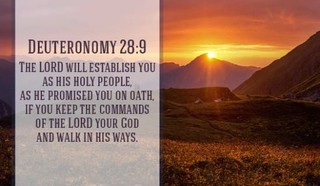
Change Translation
- Recent Translations
- All Translations
Images for Shēnméngjì 28:63


Share
Shēnméngjì 28:63 Meaning and Commentary
And it shall come to pass, [that] as the Lord rejoiced over
you to do you good
The Word of the Lord, as the Targum of Jonathan; who with great delight and pleasure in them brought them out of Egypt, conducted them through the wilderness, protecting them and providing all good things for them; and brought them into the land of Canaan, a land flowing with milk and honey, and settled them there; and gave them judges and kings, priests and prophets, for a long series of time, with other innumerable blessings he bestowed upon them:
and to multiply you;
so that they became as the stars of heaven, and the sand of the sea, as before observed:
so the Lord will rejoice over you to destroy you and to bring you to
nought;
take as much pleasure in their ruin and destruction, whereby his justice would be glorified, and the honour of his laws preserved, as before in bestowing good things on them, in which mercy and kindness were displayed:
and ye shall be plucked from off the land whither thou goest to
possess it;
in a violent manner, by their enemies, and against their wills, they being loath to leave it. The Emperor Adrian, to prevent their insurrections and rebellions, which had given him a great deal of trouble, ordered by an edict that no Jew should come into Jerusalem, nor into the land of Judea, or be seen in it, which is observed by several writers F13; by which means the country was cleared of them. In later times some of them did get thither again, but they were but few. Benjamin of Tudela, a Jew of the twelfth century, travelled into several parts of the world in quest of his countrymen, and particularly into Judea, and his view was to magnify his people; and yet owns he found at Jerusalem only two hundred persons, whose employment was dyeing wool, and dwelt in a corner of the town under the tower of David; and but twelve at Bethlehem, three at Maresha, at Shunem indeed three hundred, none at Gilead, two at Nob, who were dyers, three at Ramah, one at Joppa, none at Jafne, where had been a famous academy, none at Ashdod, and at Tiberias about fifty F14. And our countryman Sandys F15, who travelled into Judea in the seventeenth century, says,
``here be some Jews, yet inherit they no part of the land, but in their own country do live as aliens.''
F13 Justin Martyr, Tertullian, Eusebius. See Dr. Newton ut supra. (Prophesies, vol. 1. Dissert. 7. sect. 6. p. 186.)
F14 Itinerar. p. 41-53.
F15 Travels, sect. 3. p. 114. Ed. 5.
Shēnméngjì 28:63 In-Context
Study Tools
PLUSUnlock Notes
This feature is for PLUS subscribers only. Join PLUS today to access these tools and more.
JOIN PLUSUnlock Highlights
This feature is for PLUS subscribers only. Join PLUS today to access these tools and more.
JOIN PLUSUnlock Bookmarks
This feature is for PLUS subscribers only. Join PLUS today to access these tools and more.
JOIN PLUSTrack Your Reading
Create a free account to start a reading plan, or join PLUS to unlock our full suite of premium study tools.